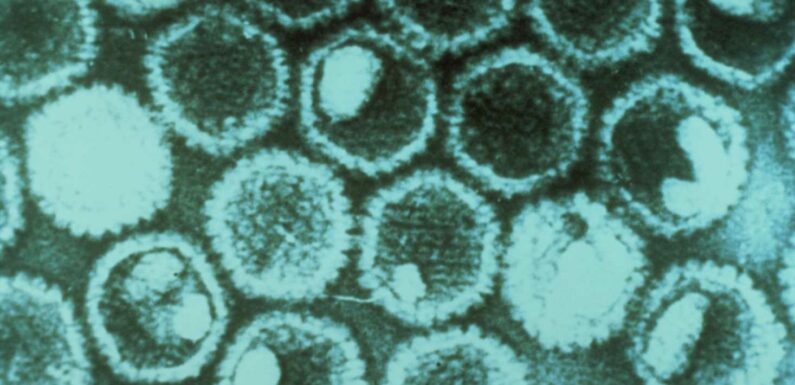
TERMINALLY ill cancer patients have been given a therapy that uses the herpes virus to destroy cells.
Medics in the UK developed the new treatment which also boosts the immune system.
A modified version of the herpes simplex virus, known as RP2, showed signs of effectiveness in a quarter of patients who had advanced cancers.
Patients who participated in the trial in London had a range of cancers.
These included skin, oesophageal and head and neck cancer.
Medics had exhausted other treatments in these cases, with these patients also having failed to respond to certain immunotherapies.
Read more on cancer treatment
Doctors astounded as drug ‘cures EVERY patient’ of bowel cancer in trial
Thousands more women set for survival-boosting breast cancer drug
Experts at The Institute of Cancer Research in London tested the virus on nine patients.
They also tested it on a further 30 patients in combination with immunotherapy nivolumab.
The genetically modified virus was injected directly into the patient's tumours.
It's designed to multiple inside cancer cells to burst them from within.
Most read in Health
New Covid-like virus discovered in a bat – raising fears it could infect humans
Diabetics set for HUGE change as once-a-week jab could replace daily meds
Major prescription change means patients will get some drugs WITHOUT seeing a GP
Major change to GP appointments revealed in massive NHS shake up
It also blocks a protein known as CTLA-4 – releasing the brakes on the immune system and increasing its ability to kill cancer cells.
Three out of nine patients treated with RP2 on its own benefitted from the treatment and saw their tumours shrink.
The medics found that one patient with salivary gland cancer saw his tumour disappear completely and he remains cancer-free – 15 months after starting treatment.
Two patients, one with oesophageal cancer and uveal melanoma found the cancer had spread to the liver.
Through the treatment they saw their cancers shrink and 15 months after treatment, their illness had not progressed.
Seven out of 30 patients who received both RP2 and the immunotherapy nivolumab also benefitted from treatment.
Cancer types, signs and symptoms
Everything you need to know about different types of Cancer
Bowel cancer symptoms: What are they and when should I start to worry?
What is prostate cancer? Signs and symptoms of the condition
What are skin cancer symptoms and what does the disease look like?
How to check your breasts for signs of cancer
Stomach cancer: Symptoms, causes, and treatments
What is a brain tumour and what are the symptoms?
What does a cancerous mole look like?
What are esophageal cancer symptoms?
Is skin cancer itchy?
How to tell the difference between haemorrhoids and cancer
Are sunbeds safe and can they cause cancer?
What is glioblastoma and what are the symptoms?
Of the seven patients receiving the combination who saw a benefit, six remained progression-free at 14 months.
Study leader Professor Kevin Harrington, Professor of Biological Cancer Therapies at The Institute of Cancer Research, London, and Consultant Oncologist at The Royal Marsden NHS Foundation Trust, said it's rare to see such a good response from a study.
"Our study shows that a genetically engineered, cancer-killing virus can deliver a one-two punch against tumours – directly destroying cancer cells from within while also calling in the immune system against them.
“Our initial trial findings suggest that a genetically engineered form of the herpes virus could potentially become a new treatment option for some patients with advanced cancers – including those who haven’t responded to other forms of immunotherapy."
Researchers said that the side effects from the treatment were mild.
The most common included fever, chills and fatigue.
They highlighted that none of these side effects were serious enough to have warranted medical attention.
Professor Kristian Helin, Chief Executive of The Institute of Cancer Research, London said viruses can be exploited to kill cancer cells.
Read More on The Sun
The 5 key factors that determine if YOU will develop deadly type 2 diabetes
I’m trolled for dressing my son like a girl – there’s nothing wrong with his clothes
He added: "Viruses are one of humanity’s oldest enemies, as we have all seen over the pandemic.
"But our new research suggests we can exploit some of the features that make them challenging adversaries to infect and kill cancer cells. It’s a small study but the initial findings are promising."
Source: Read Full Article








